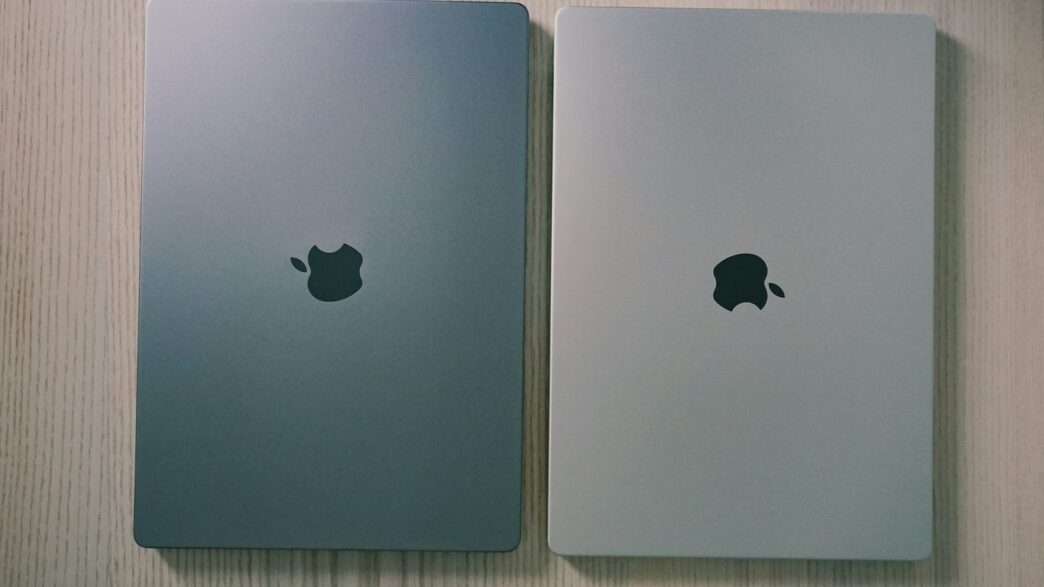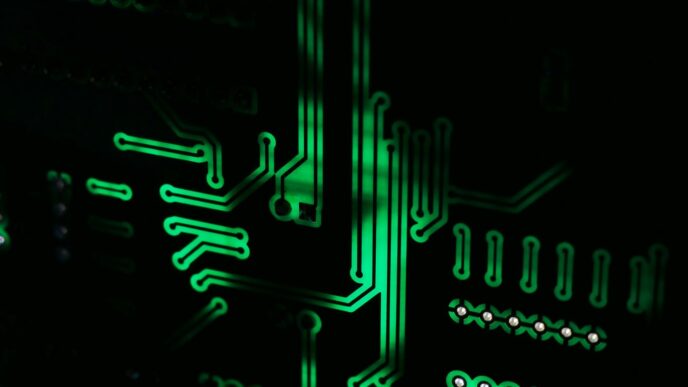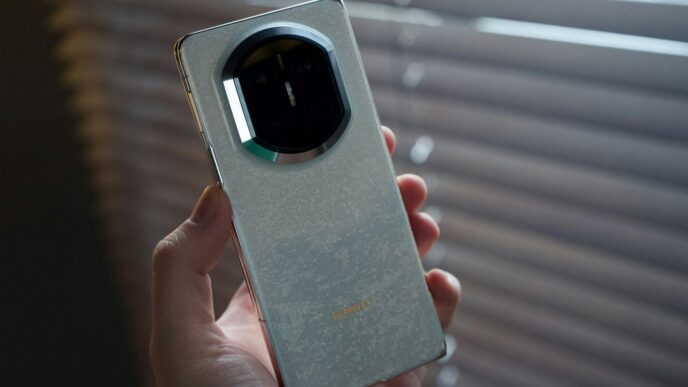Deciding between a Dell and an HP laptop in 2025 can feel like standing at a crossroads. Both companies churn out a ton of machines, and honestly, they’re both pretty good. You’ve got your workhorses, your sleek little numbers, and your gaming rigs. But what’s the real difference when you get down to it? This guide is here to break down the Dell vs HP laptops debate, looking at what actually matters for your everyday use, not just the flashy specs. We’ll cover everything from how fast they boot up to how long they last on a single charge, and even how they look on your desk.
Key Takeaways
- When looking at Dell vs HP laptops, your personal needs are the biggest factor. Neither brand is a universal winner.
- Dell often takes the lead for raw power, especially in gaming with its Alienware line, and generally offers better customer support.
- HP tends to shine when it comes to stylish design, more budget-friendly options, and making strides in eco-friendly practices.
- Both brands have seriously upped their game in 2025, offering solid performance and features across their ranges.
- Think about what you’ll use the laptop for most – work, school, gaming, or just browsing – and let that guide your choice between Dell vs HP laptops.
Performance and Specifications Showdown

Alright, let’s get down to brass tacks. When you’re looking at laptops, especially when you’re trying to decide between two big names like Dell and HP, performance is usually front and center. It’s not just about how fast it boots up, but how it handles your daily grind, whether that’s crunching numbers, editing photos, or just keeping a dozen browser tabs open without a hiccup.
Dell’s Processing Power and Innovation
Dell really likes to push the envelope, especially with their higher-end lines. Think about their Alienware gaming machines; they’re often packed with the absolute latest and greatest processors and graphics cards. We’re talking Intel Core i9 chips and NVIDIA RTX 40-series GPUs that can handle some seriously demanding tasks. Even their XPS line, aimed more at professionals and creators, gets top-tier components. They often focus on giving you raw power, which is great if you need to render video, run complex simulations, or play the latest games at high settings. They’re not afraid to put in beefy cooling systems either, which is pretty important when you’re pushing hardware to its limits.
HP’s Performance Capabilities
HP isn’t slacking off either, mind you. They have their own powerhouses, like the Omen series for gaming, which also comes with high-end CPUs and GPUs. But HP also seems to put a bit more emphasis on efficiency and balance, especially in their Spectre line. You’ll find modern Intel Core Ultra processors in some of their laptops, which are designed to be powerful yet still manage battery life well. They also offer some really nice displays, like high-resolution OLED screens that are fantastic for visual work, though sometimes with slightly lower refresh rates than the absolute top-tier gaming laptops. It feels like HP often aims for a sweet spot that works for a lot of people – strong performance without necessarily going for the absolute most extreme specs available.
Real-World Benchmark Comparisons
So, how do they stack up when you actually put them to the test? It really depends on the specific models you’re comparing. In raw processing power, especially for gaming or heavy-duty creative work, Dell’s Alienware often takes the lead with its top-spec configurations, sometimes offering higher refresh rates on displays and more powerful GPU options. For example, a high-end Alienware might boast an RTX 4090, while a comparable HP Omen might top out at an RTX 4080. However, HP’s Spectre line can offer impressive performance for everyday tasks and creative work, often with better power efficiency. For instance, a Spectre with a Core Ultra 7 might handle multitasking and light photo editing smoothly, while a Dell XPS with a similar chip would also perform well, but perhaps with a slightly different focus on component choices. It’s a bit like comparing a sports car to a very fast luxury sedan – both are quick, but they’re tuned for slightly different experiences.
Design Aesthetics and Build Quality
When you’re picking out a laptop, how it looks and feels is a pretty big deal, right? It’s not just about what’s inside; it’s about the whole experience. Both Dell and HP have really stepped up their game in this area, but they go about it a little differently.
Dell’s Functional and Durable Design
Dell often goes for a look that’s clean and professional. Think of their XPS line – it’s all about sleek aluminum and sometimes carbon fiber. It feels really solid in your hands, like it can take a bit of a beating without falling apart. This makes them great for people who are always on the move or just want something that feels built to last. They tend to keep things simple, with minimal fuss, which is perfect if you prefer a no-nonsense, reliable machine. Dell’s focus is on creating a tool that works exceptionally well and looks good doing it. It’s less about flashy trends and more about enduring quality.
HP’s Sleek and Premium Appeal
HP, on the other hand, has really leaned into making their laptops look and feel premium, almost like a piece of jewelry. Their Spectre and Envy lines, for example, often feature unique design touches, like gem-cut edges or interesting color options. They manage to make these laptops feel sturdy, often using aluminum or magnesium alloys, but they also feel surprisingly light. This makes them super portable. If you like a laptop that turns heads and feels a bit more luxurious, HP is definitely worth a look. They seem to put a lot of thought into the finer details, making them stand out.
Comparing Materials and Craftsmanship
Both brands use good materials, but the feel can be quite different. Dell often uses aluminum and carbon fiber, which gives a very robust, almost industrial feel. It’s dependable. HP also uses aluminum and magnesium, but they often combine it with finishes that feel softer or more refined to the touch. It’s a subtle difference, but you can feel it when you’re using the laptop day in and day out.
Here’s a quick look at what you might find:
- Dell:
- Materials: Aluminum, Carbon Fiber
- Feel: Solid, durable, professional
- Aesthetics: Minimalist, clean lines
- HP:
- Materials: Aluminum, Magnesium Alloy
- Feel: Premium, lightweight, refined
- Aesthetics: Stylish, modern, sometimes colorful
Ultimately, choosing between them comes down to personal preference. Do you want something that feels like a workhorse, or something that feels a bit more like a high-end accessory? Both brands have options that fit different tastes, and you can find a great Dell vs HP laptop that suits your style.
Pricing and Value Proposition
When you’re looking at laptops, the price tag is usually one of the first things you check, right? It’s not just about the number, though. It’s about what you get for your money. Both Dell and HP have a lot of options, but they tend to approach pricing a little differently.
Dell’s Premium Pricing Strategy
Dell often positions its higher-end lines, like the XPS and Alienware, at a premium. You’re paying for that sleek design, top-notch build quality, and cutting-edge performance. Think of it like buying a luxury car – you know you’re getting something special, but it comes at a cost. However, Dell isn’t all about expensive machines. Their Inspiron line offers some really solid, budget-friendly choices that don’t skimp too much on features. You can often find a decent Inspiron for under $700, which is pretty good if you’re trying to keep costs down.
HP’s More Affordable Options
HP, on the other hand, seems to have a knack for offering competitive pricing across the board. Their Pavilion and Envy series, for example, often give you a good bang for your buck. You can find capable laptops in these lines that are more affordable than Dell’s premium offerings, making them a great pick for students or anyone on a tighter budget. HP also has some really stylish machines that don’t break the bank, which is a nice bonus.
Balancing Budget with Features
So, how do you figure out which is the better deal? It really depends on what you need. If you’re after raw power, a super-premium feel, or specific gaming features, Dell’s higher-end models might be worth the investment, even if they cost more upfront. But if you’re looking for a reliable everyday laptop with a good balance of features and a more accessible price point, HP often shines. It’s all about matching your needs to what each brand offers without overspending.
Here’s a quick look at how their prices generally stack up:
| Product Category | Dell Price Range ($) | HP Price Range ($) |
|---|---|---|
| Entry-Level Laptops | 400 – 800 | 350 – 700 |
| Mid-Range Laptops | 800 – 1,500 | 700 – 1,300 |
| High-End Laptops | 1,500+ | 1,300+ |
As you can see, HP tends to be a bit more budget-friendly, especially in the entry-level and mid-range laptop segments. Dell’s high-end options can definitely get pricey, but they often come with those premium materials and advanced features.
Battery Life and Efficiency

When you’re looking at laptops, how long the battery lasts is a pretty big deal, right? Nobody wants to be tethered to a wall socket all the time. Both Dell and HP have been putting a lot of effort into this area, and it shows, though there are definitely some differences to consider.
Dell’s Battery Efficiency in Use
Dell’s approach often focuses on a solid, reliable experience. For many of their mainstream laptops, you can expect a decent day’s work out of a single charge, usually somewhere in the 7 to 8-hour range for general use. If you’re looking at their higher-end XPS models, especially those with newer, more efficient processors like the Snapdragon X Elite, battery life can really stretch. We’ve seen some XPS 13 models push past 19 hours, which is pretty wild compared to the average premium laptop’s 11-ish hours. Dell also has features like ExpressCharge, which helps you juice up your battery pretty quickly when you do need to plug in. They also have software that helps manage power, so you can see what’s using up your battery and adjust things if needed.
HP’s Battery Innovations and AI
HP seems to be pushing the envelope a bit more, especially with some of their newer lines. They’ve been known to pack in larger battery capacities, and some models are advertised with battery life that can go up to 12 hours or even more. The Spectre x360 14, for instance, has been noted for lasting around 16 hours, partly due to efficient components and power-saving screen tech like OLED. Even their gaming laptops, which usually chug power, can get a respectable 7 hours in lighter modes. HP is also looking into AI to help manage battery life, making the system smarter about how it uses power based on your habits. This can mean longer life between charges and potentially better battery health over time.
Which Brand Offers Longer Endurance?
So, who wins the battery marathon? Generally speaking, HP often has a slight edge in overall battery endurance across a wider range of their models, especially if you’re looking for that all-day-and-then-some kind of power. Their Spectre line is a good example of this. However, Dell’s top-tier XPS models are absolute champions when it comes to battery life, sometimes even surpassing HP’s best. If you’re eyeing a gaming laptop, both brands will likely fall short of the endurance you’d get from a productivity-focused machine, with Dell’s Alienware series typically offering around 5-6 hours under light use. For most everyday users, though, both brands provide enough juice to get you through a typical workday without constant charging. It really comes down to the specific model you choose and how you plan to use it.
Gaming Capabilities Compared
When it comes to gaming laptops, both Dell and HP have some serious contenders, but they definitely cater to slightly different players. Dell really leans into the high-end with its Alienware brand, aiming for those who want the absolute best performance, no matter the cost. HP, on the other hand, offers its Omen series, which often strikes a great balance between powerful gaming features and a more reasonable price tag.
Dell’s Dominance with Alienware
Dell’s Alienware line is practically synonymous with high-performance gaming. These machines are built to push the limits. We’re talking top-tier processors like Intel’s Core i9 series and NVIDIA’s most powerful graphics cards, such as the RTX 4090 or even the newer RTX 5080. They often come with massive amounts of RAM and super-fast SSDs, so loading times are a thing of the past. The displays on these laptops are also pretty wild, with refresh rates that can go up to 480Hz on some models. This means incredibly smooth visuals, which is a big deal in fast-paced games. They also tend to have advanced cooling systems, like vapor chambers, to keep things from overheating during marathon gaming sessions. If you’re chasing the highest frame rates and the most immersive experience, Alienware is usually where you’ll find it.
HP’s Omen Series Performance
HP’s Omen series is no slouch either, but it often feels more like a practical choice for serious gamers. You’ll still find powerful components, like Intel Core i9 processors and NVIDIA RTX 40-series GPUs (like the RTX 4080), but maybe not always the absolute bleeding edge that Alienware offers. The displays are still excellent, with high refresh rates like 240Hz on QHD screens, which is more than enough for most gamers to enjoy fluid gameplay. HP also puts a good amount of effort into the design and cooling of the Omen laptops, making them capable of handling demanding games without melting. They often feel a bit more understated than Alienware, which might appeal to some users who don’t want their laptop screaming ‘GAMER!’ from across the room.
Choosing the Ultimate Gaming Machine
So, which one is for you? It really boils down to your priorities and your wallet.
- For the Enthusiast: If budget isn’t a major concern and you want the absolute peak of gaming performance, Dell’s Alienware is likely your best bet. Think extreme refresh rates, the most powerful GPUs available, and robust cooling.
- For the Serious Gamer: If you want a laptop that can handle pretty much any modern game at high settings with smooth frame rates, but you also want to keep your bank account somewhat intact, HP’s Omen series is a fantastic option. It offers a great blend of power, display quality, and build.
- Consider the Specs: Always look at the specific CPU, GPU, RAM, and display refresh rate for the model you’re considering. A higher-end Omen might outperform a lower-end Alienware, and vice-versa.
Ultimately, both brands provide excellent gaming laptops, but Dell’s Alienware pushes the boundaries of what’s possible, while HP’s Omen series makes high-end gaming more accessible.
Software Experience and Support
When you buy a laptop, it’s not just about the hardware, right? The software it comes with and the support you get if something goes wrong really matter. Both Dell and HP have their own ways of handling this, and it can make a big difference in your day-to-day use.
Dell’s Clean Software Ecosystem
Dell usually keeps things pretty straightforward with their software. You’ll often find a cleaner installation of Windows, with fewer pre-installed apps you don’t need. They do include some helpful utilities, like Dell Update, which makes it easy to keep your drivers and firmware up-to-date. This is a big plus because outdated drivers can cause all sorts of weird issues. For multimedia, Dell Cinema is a feature that aims to improve the audio and video experience, making movies and music sound and look better right out of the box. It’s not overly complicated, which is nice.
HP’s Software Strategy and Bloatware
HP’s approach can be a bit more… busy. They tend to bundle more of their own software and partner applications onto their laptops. This isn’t always bad; some of it can be useful, like HP Support Assistant, which helps with troubleshooting and system checks. However, it can also feel like a lot of "bloatware" – software you didn’t ask for and might never use, which can slow down your system a little. HP also has features like HP Sure View, a privacy screen that’s built into some of their higher-end models, which is pretty neat if you work in public spaces. They also push their HP Smart app for managing printers and other HP devices.
Customer Support and Warranty Differences
When it comes to getting help, both companies offer various support plans. Dell is generally known for having solid customer support, with options for on-site service and extended warranties that can give you peace of mind. They have a pretty good reputation for sorting out problems. HP also provides reliable customer service and warranty options, including extended coverage and on-site support for many of their products. It’s worth looking at the specific warranty details for the model you’re considering, as they can vary. For example, Dell’s XPS line often comes with premium support options, and HP’s Spectre series might have similar high-tier service plans. Ultimately, the best choice often comes down to the specific model and the support package you select, as both brands have strengths in this area. If you’re looking for a new laptop in 2025, understanding these software and support aspects is key to making a good decision for your needs.
Here’s a quick look at what you might expect:
- Dell: Generally cleaner OS install, useful Dell Update utility, Dell Cinema for media.
- HP: More pre-installed software (can be bloatware), HP Support Assistant, HP Sure View privacy screen on select models.
- Support: Both offer on-site service and extended warranties, but specifics vary by model and plan.
- Warranty: Check the duration and coverage details carefully for both brands.
Sustainability and Eco-Friendliness
It’s pretty cool that both Dell and HP are actually thinking about the planet these days. It used to be that buying a new laptop meant you were just adding to the e-waste problem, but now, these companies are trying to do better. They’re both putting effort into using recycled stuff and trying to cut down on their environmental footprint. It’s not just about making a profit anymore, which is a nice change of pace.
Dell’s Commitment to Recycled Materials
Dell has been making a pretty big push with recycled materials. You’ll find a good amount of recycled aluminum in their laptops, especially in their higher-end lines like the XPS. They’re also looking at using recycled plastics and even stuff like carbon fiber. Their goal is to be more sustainable across the board, aiming for things like net-zero emissions by 2050. It’s a long-term plan, but they seem to be sticking to it.
HP’s Eco-Innovation Awards
HP has also been racking up some awards for their green initiatives. They’ve been really focused on using plastics that would otherwise end up in the ocean – you know, ocean-bound plastics. Plus, they made a big deal about running all their global operations on 100% renewable energy. That’s a pretty significant step. They seem to be a bit more aggressive with their public announcements about sustainability, which is good for keeping them accountable.
Assessing Environmental Impact
So, who’s doing better? It’s tough to say definitively because they both have different strengths. HP seems to be ahead in terms of using recycled materials like ocean-bound plastics and powering their operations with renewables. Dell is also making solid progress, particularly with recycled aluminum and their long-term emission goals.
Here’s a quick look at some of their efforts:
- Recycled Content: Both use recycled plastics and metals, but HP highlights ocean-bound plastics more prominently.
- Energy Use: HP has committed to 100% renewable energy for its operations. Dell is working towards net-zero emissions.
- Product Lifecycle: Both are exploring ways to make their products last longer and be easier to recycle at the end of their life.
Ultimately, it’s great that both are taking this seriously. For consumers, it means you can feel a little better about your purchase, knowing that these companies are at least trying to be more responsible.
So, Which One Should You Pick?
Alright, so we’ve gone through all the nitty-gritty details comparing Dell and HP laptops for 2025. It’s pretty clear that neither brand is a one-size-fits-all winner. If you’re all about raw power, top-notch gaming, or need that super reliable business machine with excellent support, Dell, especially with its Alienware line, is probably your best bet. But, if you’re looking for something that’s a bit easier on the wallet, has a really stylish look, and still gets the job done for school or creative projects, HP often hits that sweet spot. Both companies are doing cool things with sustainability and making their laptops better each year. Ultimately, the best laptop for you really just depends on what you need it for and how much you’re looking to spend. Happy hunting!
Frequently Asked Questions
Which brand is generally better for gaming, Dell or HP?
For serious gamers, Dell usually takes the lead. Their Alienware line is top-notch, offering super powerful specs and cooling systems that can handle the most demanding games. HP’s Omen series is also great and more affordable, but Alienware often has the edge in raw gaming power.
Are HP laptops more affordable than Dell laptops?
Generally, yes. HP tends to offer more budget-friendly options, especially in their Pavilion and Envy lines, making them a good choice for students or everyday users. Dell can be more expensive, particularly their premium XPS and Alienware models, but you often get top-tier performance and build quality for the price.
Which brand has better battery life?
It’s a close race! Dell’s XPS laptops are known for lasting a long time, often up to 14 hours. HP has been adding smart AI features to its laptops that help save power. In many cases, they perform very similarly, but HP’s new tech might give it a slight edge in certain situations.
When it comes to design, what’s the difference between Dell and HP?
Dell often goes for a clean, professional, and durable look, using materials like aluminum and carbon fiber that feel really solid. HP, especially with its Spectre and Envy lines, focuses on a more stylish and elegant design, sometimes with unique colors and gem-cut edges that make them stand out. HP laptops can also feel lighter and more modern.
Which brand is better for students?
For students, HP often provides a better balance of price and features. Their laptops are generally more affordable and still offer good performance and battery life for schoolwork and everyday tasks. While Dell has great options, they can be pricier.
What about environmental efforts, who is doing better?
Both companies are working hard to be eco-friendly. HP has been recognized for its efforts, using recycled plastics and running on renewable energy. Dell is also making progress with recycled materials and aiming for lower emissions. Right now, HP seems to be a bit ahead in terms of eco-innovation awards and initiatives.














